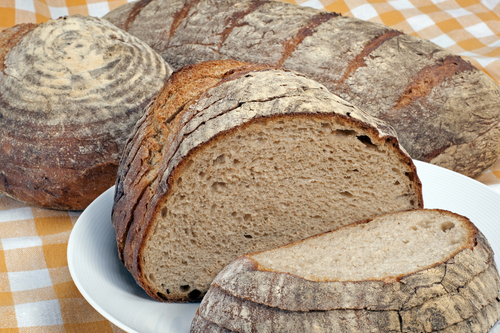Is Sourdough Bread Bad For You?
Short answer
Sourdough is good for you in moderation. It’s easier to digest, has more available minerals, and is gentler on your blood sugar than other varieties of bread.
Recommended Alternative
Overall beneficial to your health. Things rated a 'B' may have some harmful qualities to pay attention to.
View Full Grading System
Category 'A'
Very healthy and numerous health benefits. Side effects are rare. Things rated an 'A+' are typically necessary for survival (for example, water).
Very healthy and numerous health benefits. A few harmful qualities may be associated, but only under certain circumstances such as an allergic reaction.
Very healthy and numerous health benefits. Harmful qualities may be associated, but aren't usually serious.
It is important to note that even the best things in life can become bad in immoderate amounts. So, although something may be rated an 'A+', overconsumption/overdoing can bring unwanted effects.
Category 'B'
Very beneficial to your health. Things rated a 'B+' may have a few harmful qualities to pay attention to.
Overall beneficial to your health. Things rated a 'B' may have some harmful qualities to pay attention to.
More beneficial to your health than not. However, harmful qualities are most likely associated and shouldn't be overlooked.
The main difference between category 'A' and category 'B' is the harmful qualities typically present in 'B' items. Serious side effects are usually uncommon, but are still possible and should be taken note of.
Category 'C'
Both beneficial and harmful qualities associated. Things rated a 'C+' are typically a bit more on the beneficial side. Still, moderation is important.
A fairly even ratio of beneficial and harmful qualities. Moderation is important. Very general topics that can lean towards both sides of the spectrum will be placed here as well. Rice, for example, can be good or bad depending on the type.
More harmful than beneficial. Side effects are common, especially when consumed/done excessively. Moderation is very important.
Category 'C' usually denotes to both good and bad qualities. When it comes to this category, it is important to keep this word in mind: moderation.
Category 'D'
Harmful to your health. Although benefits may be associated, the bad most likely outweighs the good. Moderation is very important.
Harmful to your health. A few benefits may be associated, but the bad outweighs the good. Moderation is extremely important.
Harmful to your health. Very few, if any, benefits are present. Things in this category should be avoided as much as possible.
Category 'D' is typically for things that are more harmful than beneficial. While consuming/doing something unhealthy once in a blue moon shouldn't hurt, we definitely recommend eliminating 'D' items as a regular part of your routine/diet.
Category 'F'
Category 'F' is for things that fail to bring anything beneficial to the table, and are very harmful to your health. We recommend completely avoiding anything in this category. Long-term side effects of 'F' items are usually very serious.
Category 'N'
'N' stands for neutral. Things placed into this category are generally (a) neither good nor bad for you, or (b) lack the necessary evidence to reach any conclusions.
Long answer
Sourdough bread is made from a dough that's more fermented than usual. The bacteria and yeast found in sourdough starter feed on the flour in the dough. The bacteria are called lactobacillus - they eat the flour and convert it into lactic acid. This process of fermentation takes much longer with sourdough than it does with other breads.
Because of the long fermentation process, sourdough has some unique qualities. The good stuff in sourdough is more accessible to your digestive system. That's in part because sourdough is acidic; chemicals called phytates are reduced as the more lactic acid is produced and the pH of the dough drops. This is a good thing - phytates bind with minerals, making them harder for our bodies to digest and use. Fewer phytates mean more zinc, magnesium, and iron for you.
Sourdough fermentation also breaks down gluten. Those unfortunate enough to suffer from Celiac's disease can't digest much gluten at all; it locks up their digestive system with pain, gas, and irritation. For those of us without Celiac's, digesting gluten takes effort on the part of the microbiota in our gut; it's a long molecule that can take several hours to digest. Studies have shown that the lactobacillus in sourdough bread can slash that time considerably, making the energy and nutrients from gluten available quicker.
The hardworking lactobacillus also softens up the starches in sourdough. This makes them easier for the body to digest and delivers their sugars to the blood more slowly. This may be why sourdough has a relatively low glycemic index - when it hits your bloodstream, it doesn't trigger a massive spike in blood sugar. That makes sourdough a more viable option for bread lovers who deal with metabolic syndrome or diabetes. One study published in Acta Diabetologia found that insulin response and blood glucose levels in subjects with diabetes were actually improved after eating sourdough.

Benefits
- minerals more available
-
starches softened by fermentation process
-
fermentaion breaks down gluten, making it easy to digest
-
relatively low glycemic index
Our Wellness Pick
(what is this?)
Mestemacher Whole Rye Bread
- Rich in fiber
- Whole-grain benefits
- Natural ingredients
- Convenient pack of 6
- No added preservatives
Learn More!
Please turn your Ad Blocker off to see this content. Thank you!

 Approved by
Approved by 















